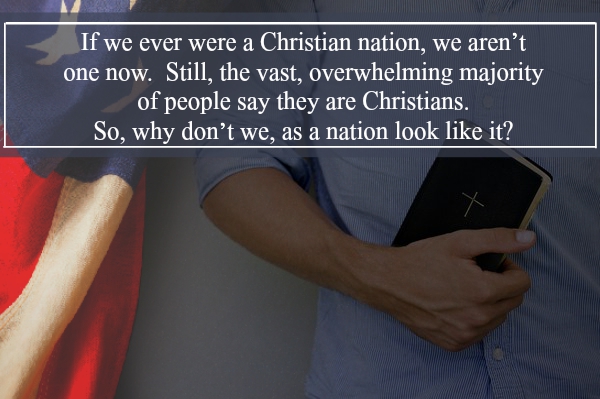A recent ABCNEWS/Beliefnet poll found 83 percent of Americans self-identify as Christians. But if 83 percent of the nation’s population is Christian, why do we have so many abortions and out-of-wedlock births, and so much divorce. And why is homosexual marriage now the law of the land?
In other words, why is sexual freedom trumping biblical sexual ethics even to the point that — now — our laws force the acceptance of sexual immorality? If so much of the nation claims Christianity, shouldn’t that Christianity be reflected in the prevailing morals and practices?
One answer is that lots of so-called Christians are simply defining their own Christianity. In this same poll, the open-ended question, “What is your religion?” was asked. Among the self-identified Christians, there were 50 different answers. Most of the 50 affiliations cited are Christian denominations, ranging from the Assemblies of God to the United Church of Christ. But, when you drill down, you find that many of the denominations mentioned have strayed far from biblical orthodoxy on sexual and other matters. We’ve lost the cultural consensus that once held to a biblical sexual ethic. So, on the hot-button issues concerning sexuality, sin and selfishness reign in the culture.
If we ever were a Christian nation, we aren’t one now. Still, the vast, overwhelming majority of people say they are Christians. So, why don’t we, as a nation look like it?
I think it’s because so many Christians have a sort of fruit-salad understanding of their faith. Along with healthy doses of poverty-fighting and environmentally-protective beliefs they’ll throw in tolerance for serial marriage, cohabitation and a willingness to easily jettison the God-ordained definition of marriage. We often find these fruit salad Christians really can’t answer questions about the basics of the faith.
In many of the 50 denominations cited in this poll, having a personal relationship with Jesus Christ is not stressed. In others, that personal relationship doesn’t extend to obedience. My pastor says, “Faith has to be personal, but not personalized.” “Faith is not customizable.”
Some denominations have de-emphasized learning and reciting the historic creeds of the faith. Others are not formally catechizing (or teaching) members their historic doctrinal positions.
A creed is a statement of faith, of belief, not of required behavior. It says ‘I believe this.’ Americans are individualists. But American Christians are part of Christ’s body. God’s rules for its proper functioning are laid out in scripture. Creeds are not scripture, but they help us internalize basic scriptural principles agreed upon by respected theologians over the centuries. A creed is not up for a vote. Its purpose is to declare and safeguard God’s truth about Himself.
Reciting, for example, the Apostle’s Creed, concisely summarizes the Christian faith. If someone asks what you believe, the basics are right there. It’s no coincidence that as American denominations have de-emphasized learning and reciting the great creeds, the church’s influence on the culture has lessened.
 Listen Online
Listen Online Watch Online
Watch Online Find a Station in Your Area
Find a Station in Your Area









 Listen Now
Listen Now Watch Online
Watch Online
